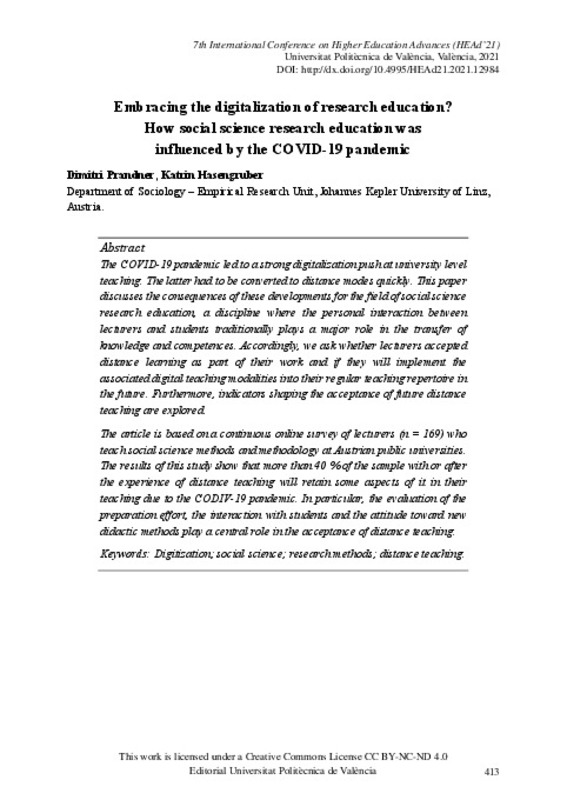JavaScript is disabled for your browser. Some features of this site may not work without it.
Buscar en RiuNet
Listar
Mi cuenta
Estadísticas
Ayuda RiuNet
Admin. UPV
Embracing the digitalization of research education? How social science research education was influenced by the COVID-19 pandemic
Mostrar el registro sencillo del ítem
Ficheros en el ítem
| dc.contributor.author | Prandner, Dimitri
|
es_ES |
| dc.contributor.author | Hasengruber, Katrin
|
es_ES |
| dc.date.accessioned | 2021-09-20T08:08:21Z | |
| dc.date.available | 2021-09-20T08:08:21Z | |
| dc.date.issued | 2021-07-26 | |
| dc.identifier.isbn | 9788490489758 | |
| dc.identifier.issn | 2603-5871 | |
| dc.identifier.uri | http://hdl.handle.net/10251/172815 | |
| dc.description.abstract | [EN] The COVID-19 pandemic led to a strong digitalization push at university level teaching. The latter had to be converted to distance modes quickly. This paper discusses the consequences of these developments for the field of social science research education, a discipline where the personal interaction between lecturers and students traditionally plays a major role in the transfer of knowledge and competences. Accordingly, we ask whether lecturers accepted distance learning as part of their work and if they will implement the associated digital teaching modalities into their regular teaching repertoire in the future. Furthermore, indicators shaping the acceptance of future distance teaching are explored. The article is based on a continuous online survey of lecturers (n = 169) who teach social science methods and methodology at Austrian public universities. The results of this study show that more than 40 % of the sample with or after the experience of distance teaching will retain some aspects of it in their teaching due to the CODIV-19 pandemic. In particular, the evaluation of the preparation effort, the interaction with students and the attitude toward new didactic methods play a central role in the acceptance of distance teaching. | es_ES |
| dc.format.extent | 8 | es_ES |
| dc.language | Inglés | es_ES |
| dc.publisher | Editorial Universitat Politècnica de València | es_ES |
| dc.relation.ispartof | 7th International Conference on Higher Education Advances (HEAd'21) | |
| dc.rights | Reconocimiento - No comercial - Sin obra derivada (by-nc-nd) | es_ES |
| dc.subject | Higher Education | es_ES |
| dc.subject | Learning | es_ES |
| dc.subject | Educational systems | es_ES |
| dc.subject | Teaching | es_ES |
| dc.subject | Digitization | es_ES |
| dc.subject | Social science | es_ES |
| dc.subject | Research methods | es_ES |
| dc.subject | Distance teaching | es_ES |
| dc.title | Embracing the digitalization of research education? How social science research education was influenced by the COVID-19 pandemic | es_ES |
| dc.type | Capítulo de libro | es_ES |
| dc.type | Comunicación en congreso | es_ES |
| dc.identifier.doi | 10.4995/HEAd21.2021.12984 | |
| dc.rights.accessRights | Abierto | es_ES |
| dc.description.bibliographicCitation | Prandner, D.; Hasengruber, K. (2021). Embracing the digitalization of research education? How social science research education was influenced by the COVID-19 pandemic. En 7th International Conference on Higher Education Advances (HEAd'21). Editorial Universitat Politècnica de València. 413-420. https://doi.org/10.4995/HEAd21.2021.12984 | es_ES |
| dc.description.accrualMethod | OCS | es_ES |
| dc.relation.conferencename | Seventh International Conference on Higher Education Advances | es_ES |
| dc.relation.conferencedate | Junio 22-23, 2021 | es_ES |
| dc.relation.conferenceplace | València, Spain | es_ES |
| dc.relation.publisherversion | http://ocs.editorial.upv.es/index.php/HEAD/HEAd21/paper/view/12984 | es_ES |
| dc.description.upvformatpinicio | 413 | es_ES |
| dc.description.upvformatpfin | 420 | es_ES |
| dc.type.version | info:eu-repo/semantics/publishedVersion | es_ES |
| dc.relation.pasarela | OCS\12984 | es_ES |








